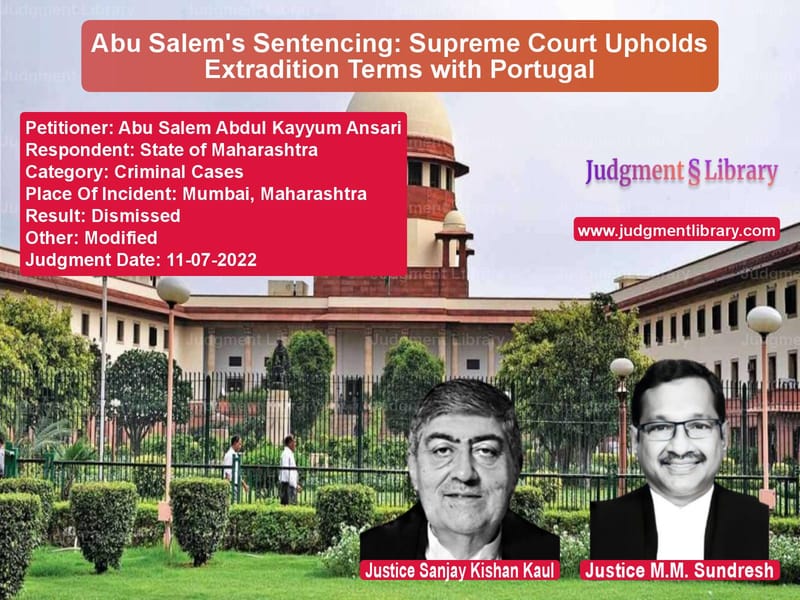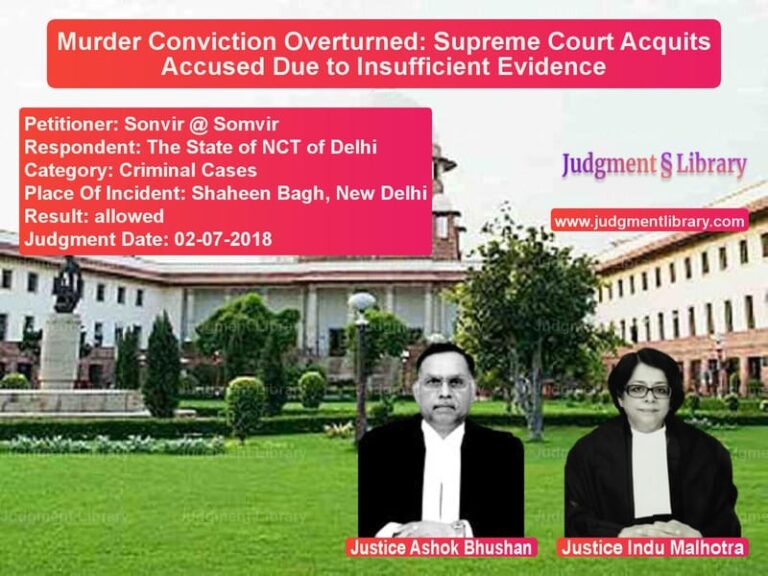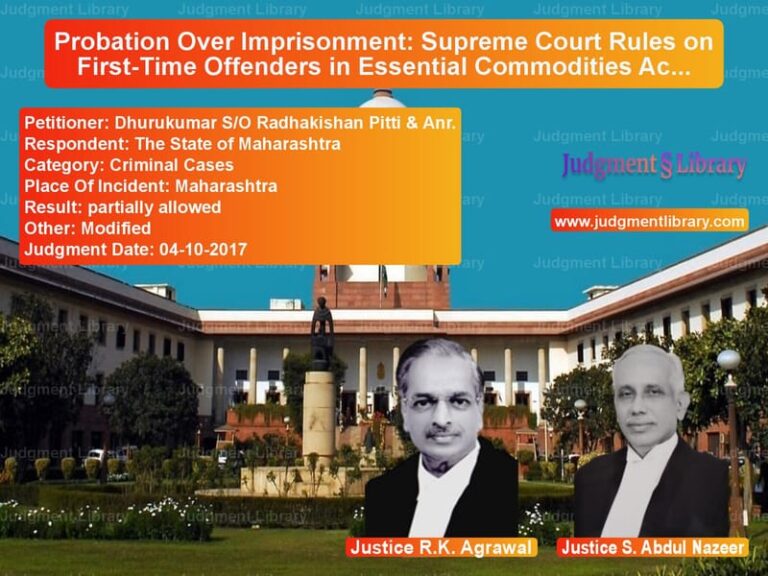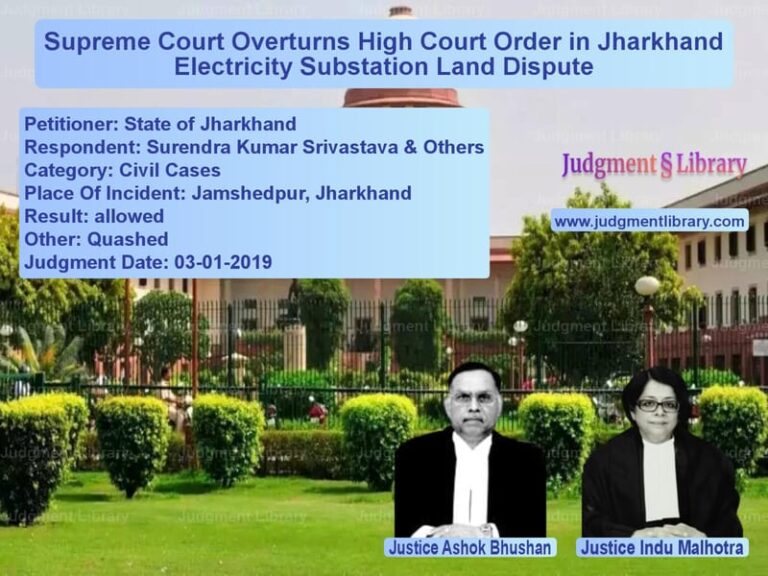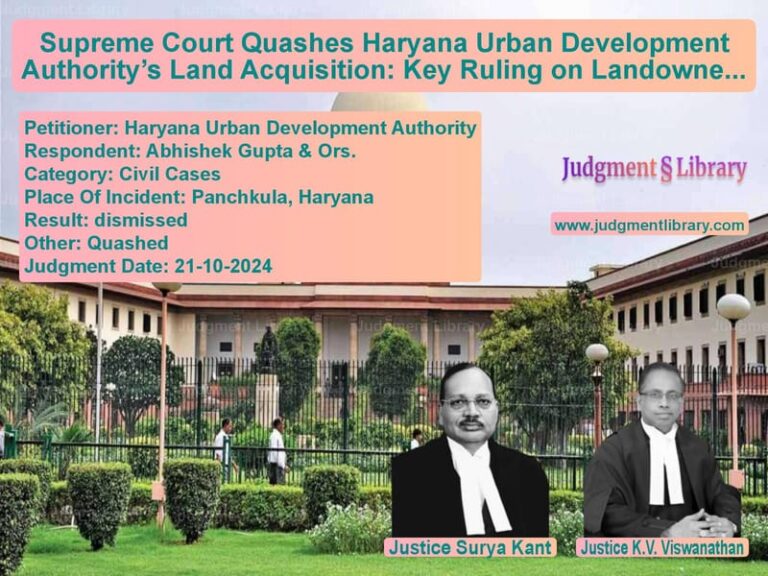Abu Salem’s Sentencing: Supreme Court Upholds Extradition Terms with Portugal
The Supreme Court of India, in a landmark ruling, addressed the sentencing of Abu Salem Abdul Kayyum Ansari, a convict in multiple criminal cases, including the infamous 1993 Mumbai bomb blasts. The case revolved around the extradition of Abu Salem from Portugal and the Indian government’s solemn assurance to the Portuguese authorities regarding the quantum of his sentence. The Court upheld the government’s commitment that Abu Salem would not be sentenced to more than 25 years in prison, reinforcing the principle of comity of courts in international extradition cases.
Background of the Case
Abu Salem was accused of participating in criminal activities, including organized crime, extortion, and involvement in the 1993 Mumbai bomb blasts, which resulted in significant loss of life and property. After fleeing India, he was arrested in Portugal in 2002 based on an Interpol Red Corner notice. The Government of India sought his extradition from Portugal for trial in India.
In response to Portugal’s legal framework, which does not permit extradition if the accused faces a life sentence or death penalty, the Indian government provided a solemn sovereign assurance. This assurance, given in 2002 and 2003, stated that upon his extradition, Abu Salem would not be subjected to capital punishment or imprisonment exceeding 25 years.
Key Legal Issues
- Whether the Indian courts were bound by the government’s sovereign assurance given to Portugal?
- Whether Abu Salem’s sentence should be capped at 25 years as per the assurance?
- Whether Abu Salem was entitled to have the time spent in Portugal counted towards his sentence?
Arguments Presented
Petitioner’s (Abu Salem’s) Arguments:
- The Indian government had given an explicit commitment to Portugal that he would not be sentenced beyond 25 years.
- Since the assurance was crucial in securing his extradition, it should be binding on Indian courts.
- His sentence should be reduced, considering the time he spent in detention in Portugal before being extradited.
Respondent’s (State of Maharashtra and CBI) Arguments:
- The Indian judiciary is independent, and the government’s assurance to Portugal does not limit the courts’ sentencing powers.
- However, the government would honor its commitment and take necessary steps when the time comes.
- The principle of comity of courts should be maintained, and India must uphold its international obligations.
Supreme Court’s Observations and Ruling
The Supreme Court ruled that:
- The Indian government’s assurance to Portugal was legally binding and must be honored.
- The judiciary had the power to impose a sentence as per Indian laws, but the executive was responsible for ensuring that the final punishment complied with the assurance.
- Upon completion of 25 years in custody, the government must take steps to release Abu Salem, either through commutation of the sentence or executive action.
- The time spent in Portugal before extradition would not be counted toward the sentence as it was served for a separate conviction in Portugal.
The Court emphasized:
“The assurance given by the Government of India was crucial in securing the extradition, and it must be honored to maintain India’s credibility in international legal cooperation.”
The Court directed that upon the completion of 25 years, the Indian government must initiate proceedings to ensure compliance with the assurance and consider Abu Salem’s release.
Key Takeaways from the Judgment
- This ruling upholds the principle of international legal commitments and comity of courts.
- The government’s executive powers can be used to ensure compliance with extradition assurances.
- The judiciary retains its sentencing power, but the government must act to ensure that commitments to foreign states are upheld.
- The time spent in foreign custody for a separate conviction cannot be set off against the Indian sentence.
Impact of the Judgment
- The ruling reinforces India’s credibility in honoring international extradition agreements.
- It sets a precedent for future extradition cases where sovereign assurances are given.
- It clarifies the role of the judiciary and executive in cases involving international legal commitments.
- Ensures that convicts extradited under assurances are not subjected to harsher penalties than agreed upon.
Conclusion
The Supreme Court’s decision in this case balances India’s international obligations with its judicial independence. While the court imposed a sentence as per Indian law, it placed the onus on the government to ensure compliance with its assurance to Portugal. This ruling strengthens India’s position in international extradition cases and ensures that the country remains a reliable partner in global legal cooperation.
Petitioner Name: Abu Salem Abdul Kayyum Ansari.Respondent Name: State of Maharashtra.Judgment By: Justice Sanjay Kishan Kaul, Justice M.M. Sundresh.Place Of Incident: Mumbai, Maharashtra.Judgment Date: 11-07-2022.
Don’t miss out on the full details! Download the complete judgment in PDF format below and gain valuable insights instantly!
Download Judgment: abu-salem-abdul-kayy-vs-state-of-maharashtra-supreme-court-of-india-judgment-dated-11-07-2022.pdf
Directly Download Judgment: Directly download this Judgment
See all petitions in Terrorist Activities
See all petitions in Extortion and Blackmail
See all petitions in Money Laundering Cases
See all petitions in Judgment by Sanjay Kishan Kaul
See all petitions in Judgment by M.M. Sundresh
See all petitions in dismissed
See all petitions in Modified
See all petitions in supreme court of India judgments July 2022
See all petitions in 2022 judgments
See all posts in Criminal Cases Category
See all allowed petitions in Criminal Cases Category
See all Dismissed petitions in Criminal Cases Category
See all partially allowed petitions in Criminal Cases Category

